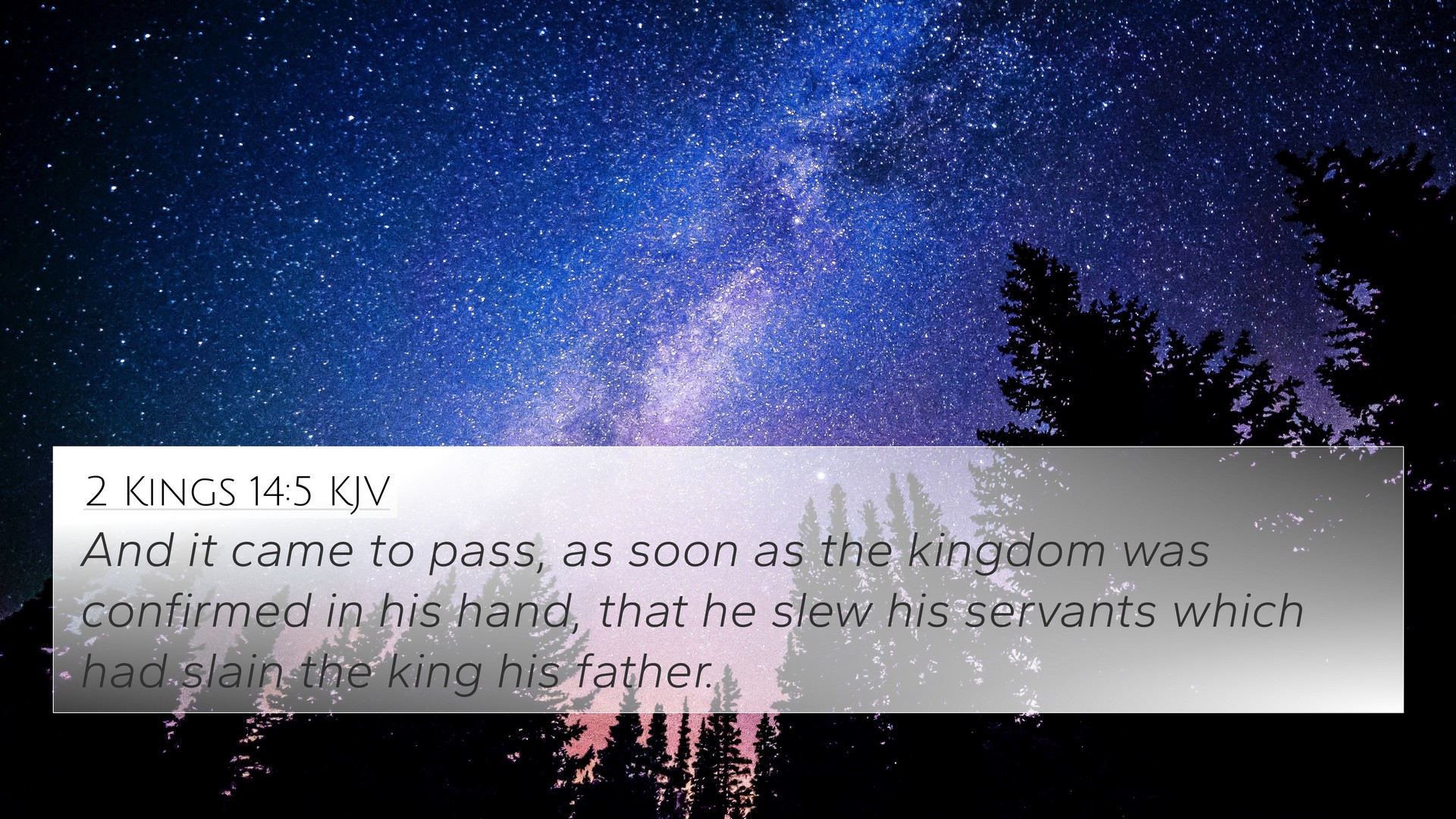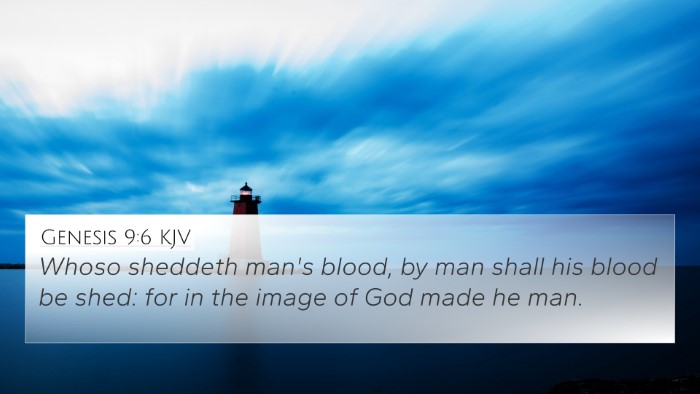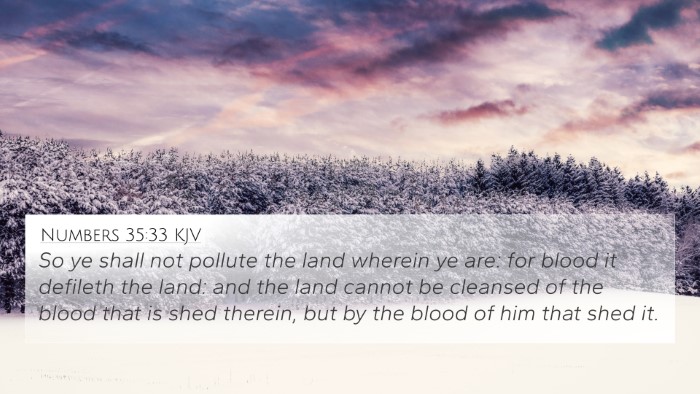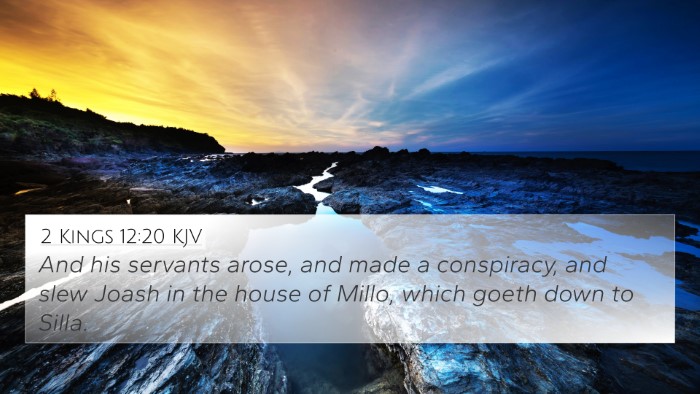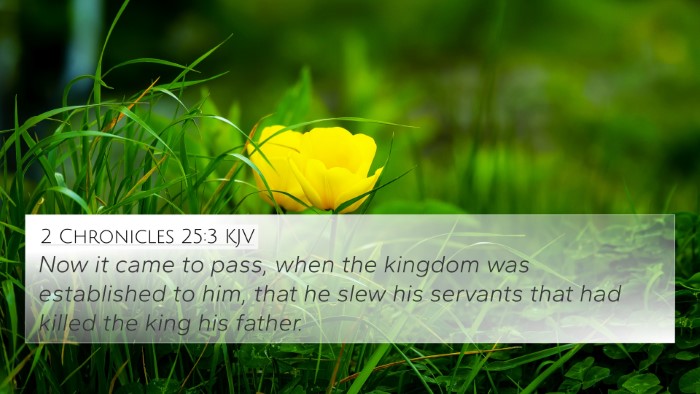Understanding 2 Kings 14:5
Verse: "And it came to pass, as soon as the kingdom was established in his hand, that he slew his servants that had slain the king his father."
This verse speaks about the actions of Amaziah, the son of Joash, once he had confirmed his reign over Judah. It highlights themes of justice, vengeance, and the establishment of authority following a period of upheaval.
Key Themes and Interpretations
- Establishment of Authority: Once Amaziah's rule was acknowledged, he felt compelled to assert his authority, which included addressing the murder of his father.
- Vengeance and Justice: His actions reflect a common theme in ancient monarchies where the new king would eliminate threats to his reign, illustrating the brutal nature of power dynamics.
- Divine Favor: Matthew Henry notes that God’s providence was at work in preserving Amaziah’s life in the midst of political intrigue.
- Family Loyalty: This act can be viewed as an assertion of familial loyalty, emphasizing that he sought to avenge his father's assassination.
Bible Verse Cross-References
- 2 Kings 12:20-21: Discusses the assassination of King Joash, providing context for Amaziah's actions.
- 2 Chronicles 25:3-4: Further elaborates on the story of Amaziah, giving insight into his reign and subsequent actions.
- Exodus 21:12: Reflects the principle of justice, which can be applied to Amaziah's decisions in this verse.
- Psalms 37:28: Speaks to God’s preservation of the righteous, hinting at the divine approval of Amaziah’s kingship.
- Proverbs 20:22: Encourages waiting for the Lord’s justice, contrasting with Amaziah's immediate actions.
- Matthew 5:38-39: Jesus teaches on turning the other cheek, raising moral questions about Amaziah's vengeance.
- Romans 12:19: Reminds believers that vengeance belongs to God, echoing themes of divine justice.
- 1 Peter 2:14: Indicates the role of a ruler as a servant of God for good, presenting a reflection on kingship.
- Micah 6:8: Calls for justice, love, and humility, providing a framework to analyze Amaziah's choice.
- Revelation 6:10: Highlights the cry for justice from martyrs, echoing the sentiments of Amaziah's situation.
Connecting the Dots: Comparative Bible Verse Analysis
This verse illustrates the common biblical theme of retribution seen throughout scripture. Kings often felt a duty to avenge wrongdoing against their families. The link between this narrative and the ethical teachings found in Proverbs and the New Testament highlights the complexity of justice in a fallen world.
Impact of Amaziah's Decision
Amaziah’s immediate response to eliminate the assassins suggests a zealous protection of his throne, but also raises questions about impulsive justice versus divinely commanded actions. Adam Clarke emphasizes that while a ruler must act to protect their throne, the moral implications of such decisions should be weighed carefully.
Conclusion: Lessons from 2 Kings 14:5
This verse serves as a poignant reminder of the nature of authority and the responsibilities bestowed upon those in power. It challenges readers to consider the ethical boundaries within leadership roles, emphasizing the need for wise and just governance rooted in faith and righteousness.
Further Insights: Tools for Bible Cross-Referencing
Engaging in cross-referencing biblical texts can unveil the rich tapestry of scripture, showing how various passages illuminate similar themes and teachings. Utilizing a bible concordance, bible cross-reference guide, and engaging in cross-reference Bible study can significantly enhance understanding.
